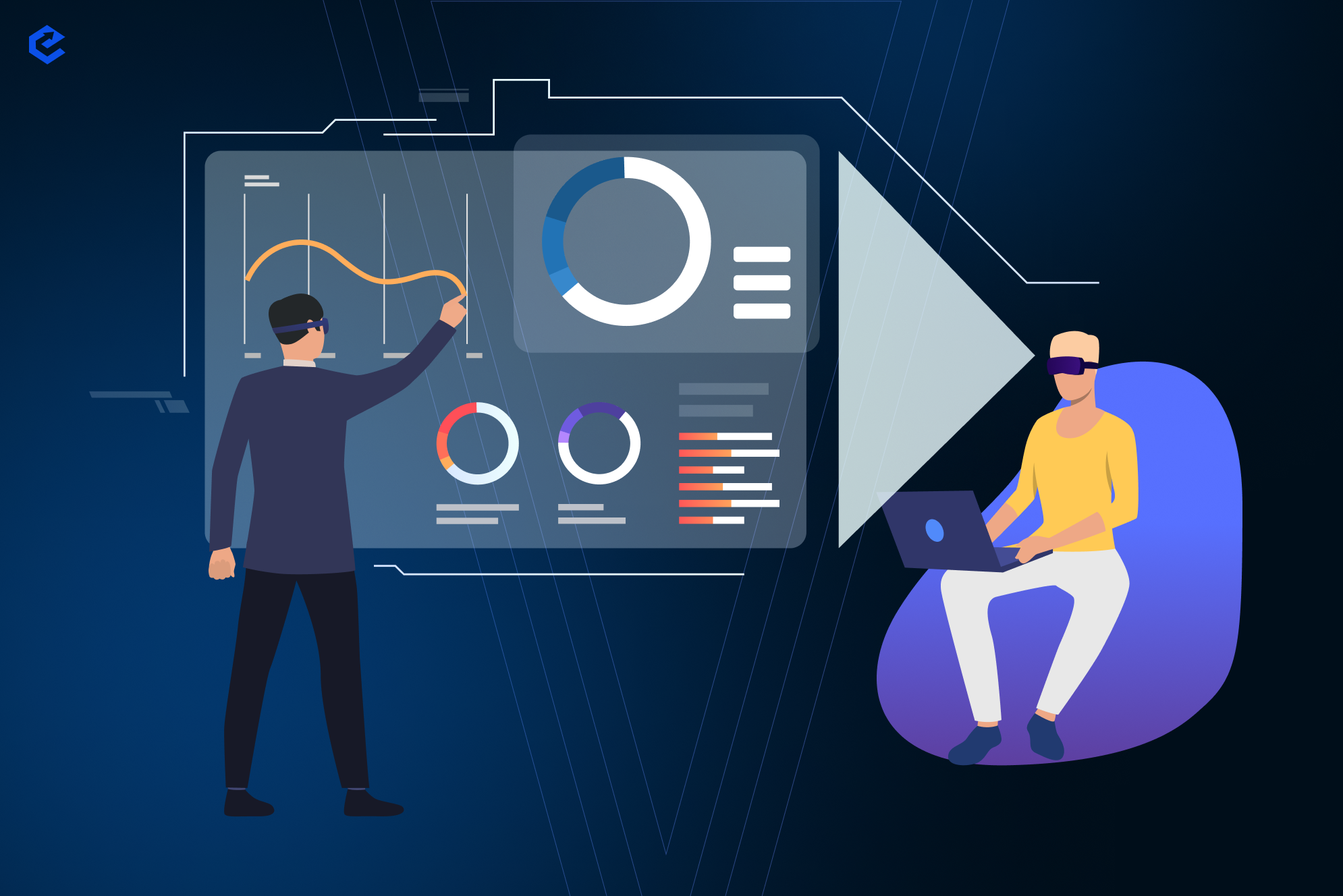
How AI is Revolutionizing Operations for SMBs in 2025
By 2025, Artificial Intelligence (AI) will no longer remain a futuristic idea or concept but will be a force that is transforming the way businesses are conducted. Small and medium-sized businesses (SMBs) are now taking advantage of the strengths of AI to streamline operations, improve customer experiences, and reduce process time. Since the generation of AI technologies is growing with mind-blowing speed, one can rightfully claim that the development of AI is a game-changer among SMBs. In this blog, we will see how AI is reshaping many aspects of business operations in SMBs, the role of AI in decision-making, and how businesses can use AI to retain their competitiveness.
Artificial Intelligence is reshaping any industry, ranging from the automation of monotonous activities to the forecast of trends. Besides efficiency, it also allows SMBs to deliver a personal experience to customers. This blog provides a breakdown of the role of AI in SMB operations in 2025.
It is time to plunge into how AI Development Solutions, AI Software Development, and AI Integration Services are helping SMBs grow their businesses and become more productive and profitable.
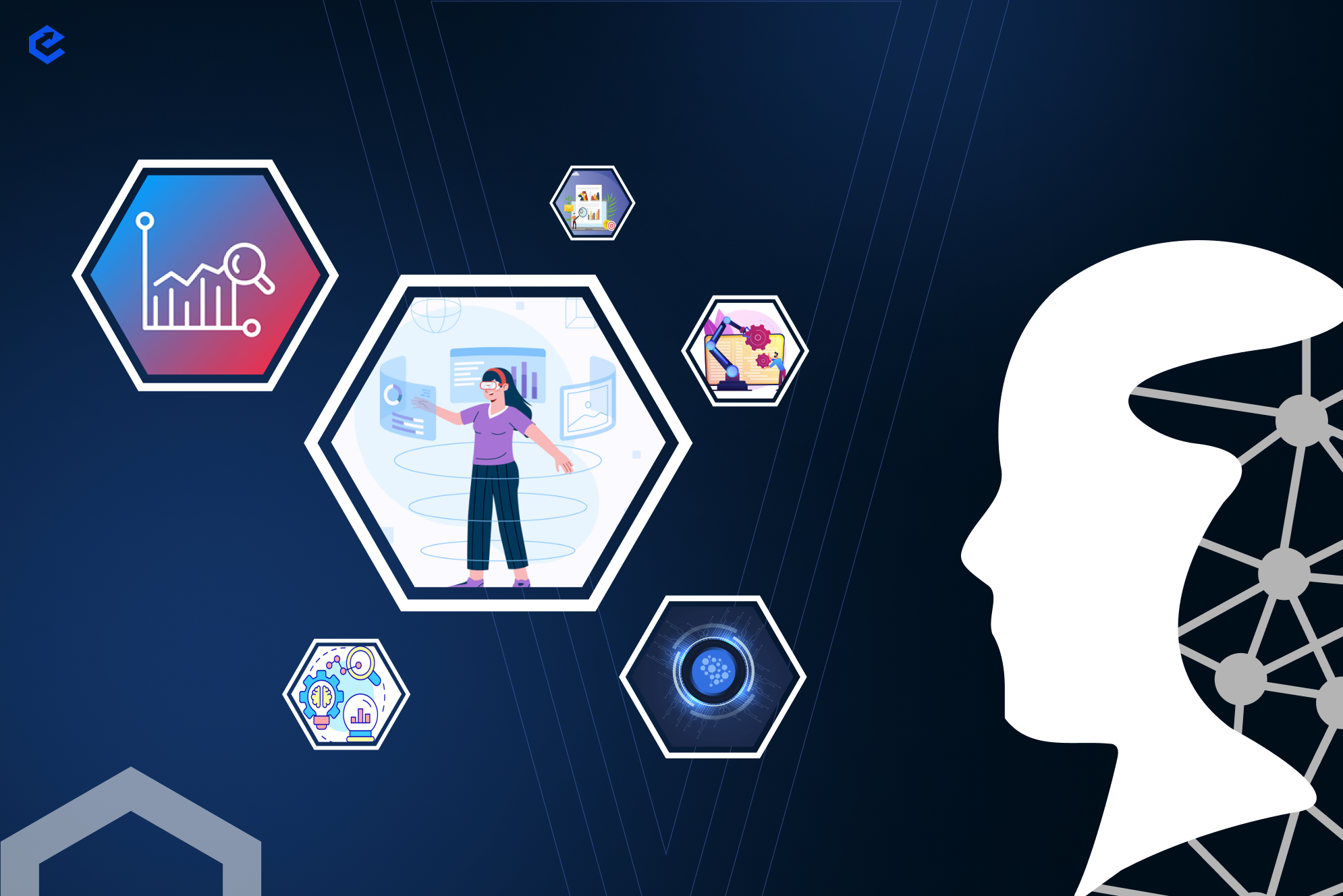
Why is AI Integration Crucial for SMBs in 2025?
Artificial Intelligence (AI) in business is set to become an essential building block for Small and Medium-sized Businesses (SMBs) as we usher in 2025. By 2025, the situation will change as AI tools and technology’s cost, scalability, and availability become more affordable, scalable, and available than ever. All these developments are reducing the playing field between SMBs and large corporations so that SMBs can utilize AI to become more efficient, make superior decisions, and improve customer interactions.
1. AI for Automation:
Automation through AI is one of the most considerable advantages SMBs can use by 2025. Automating routine practices like inventory management, accounting, and even customer service enables the business to liberate valuable human resources and devote them to greater strategic interests. This not only decreases the margin of error but also saves time and reduces the cost of operations. For example, AI algorithms can monitor the inventory level by themselves, send invoices, and offer round-the-clock customer support so that businesses will function well without overworking employees.
2. AI for Personalization:
The AI enables SMBs to change the nature of the connection between them and their clientele in a way that creates personalized opportunities on a scale never possible before. Businesses can also use AI tools to understand customers’ information and behavior patterns to provide them with custom marketing, recommendations, and services. Such a degree of personalization is largely positive in the customers’ experience, making them more loyal by feeling valued and understood. It could be in the form of personalized emails, product recommendations, or dynamic pricing. Still, through AI, SMBs can use it to offer an experience that is correlated to customer preferences and behaviors, improving customer retention levels.
3. AI for Predictive Analytics:
Also, besides automation and personalization, AI enables potent predictive analytics abilities. By analyzing big data through machine learning algorithms, SMBs may predict market trends and customer demand and make more informed decisions regarding pricing, inventory, and resource allocation. Such insights enable companies to maximize operations, minimize waste, and improve their profitability by implementing their own strategies using data with the latest data trends. AI will also allow SMBs to recognize threats and opportunities, which will make it less complicated for them to stay ahead of the competition.
SMBs must use the expert’s help to incorporate AI into their business effectively. The services offered by AI development companies will give the tools and patronage that companies need to take advantage of AI technology. SMBs can also achieve this by collaborating with a business AI software development company and getting the implementation process away without any hassles. Automation, personalization, or even predictive analytics AI development solutions are essential to SMBs who want to remain competitive in 2025 and beyond.
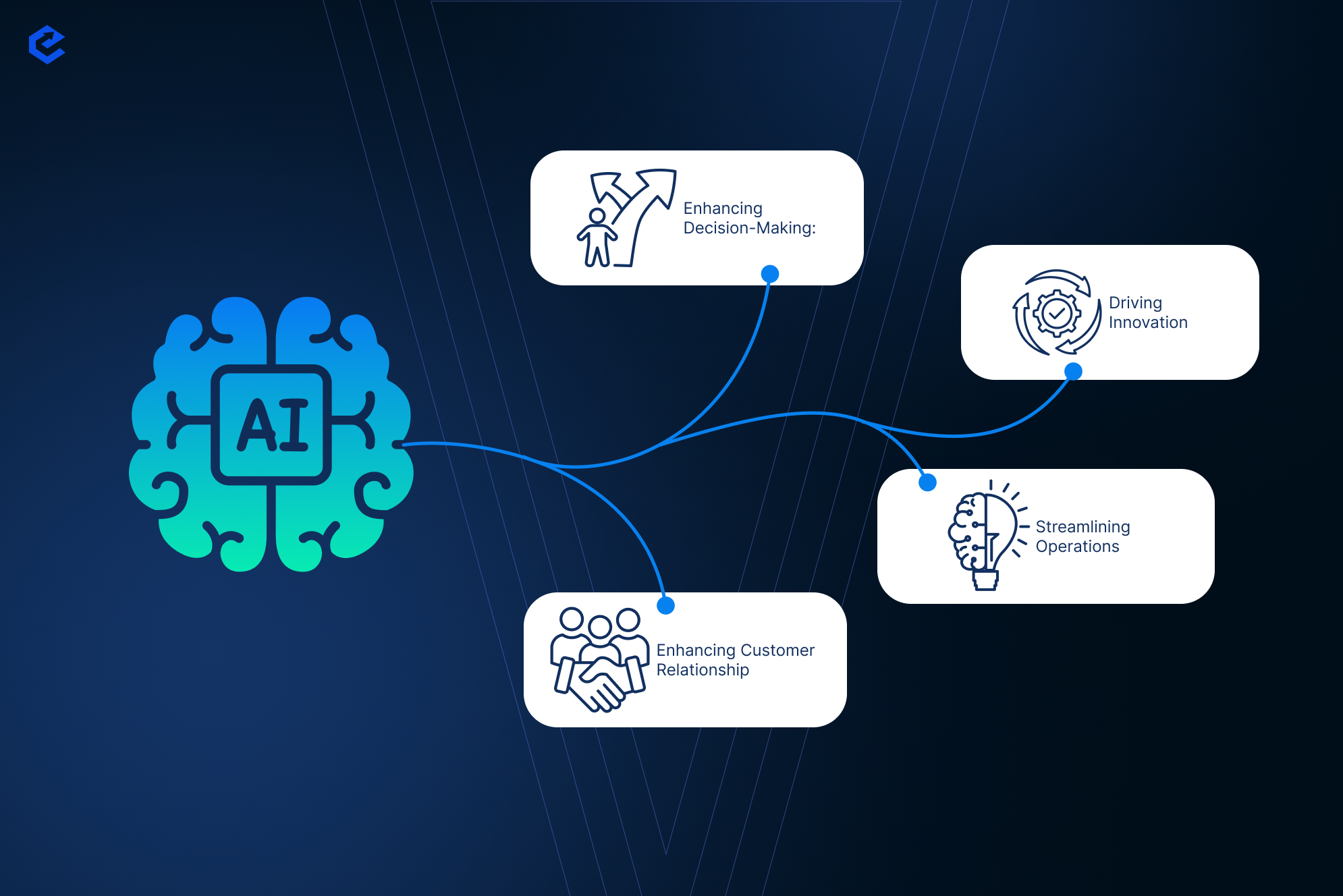
What is AI’s True Role in Modern Business?
Artificial intelligence is quickly changing how business happens, which means new opportunities exist to improve, grow, and become innovative. Businesses can optimize processes and streamline several departments to enhance performance using advanced algorithms and machine learning.
1. Enhancing Decision-Making:
AI is essential in helping companies make more intelligent decisions using data. With the ability to process large quantities of data quickly and provide actionable insights that would take human beings so long to interpret, AI algorithms could be used to derive deep learning and machine learning insights on a greater level. This will enable the businesses to make quick and better decisions, e.g., product development and marketing strategies, or financial planning. More accurate decisions are taken, resulting in better and lesser risks.
2. Streamlining Operations:
Routine and repetitive activities can be engineered using AI-assisted tools, including chatbots, virtual assistants, and robotic process automation (RPA). They alleviate the burden on human employees and limit mistakes by handling customer service inquiries, inventory regulations, transactions, etc. By simplifying operations, businesses may maximize productivity, streamline the distribution of remaining resources, and lower operations costs while producing quality output regularly.
3. Enhancing Customer Relationship:
Artificial intelligence is also changing how businesses interact with their customers. AI can render a customizable experience through customer segmentation and analysis of customer behavior based on individual reactions. AI enables merchants to provide personalized marketing offers, product suggestions, and price status, resulting in high customer service levels, loyalty, and retention.
4. Driving Innovation:
AI allows companies to remain competitive by developing new products and services. AI can analyze customer needs, preferences, and emerging market trends to present invaluable information that can be used to generate innovations and new revenue sources.
Working with an AI app development company, a business can create its own AI solution that works according to the necessities of a specific business, ensuring an advantage over the competitors and stabilizing future processes.
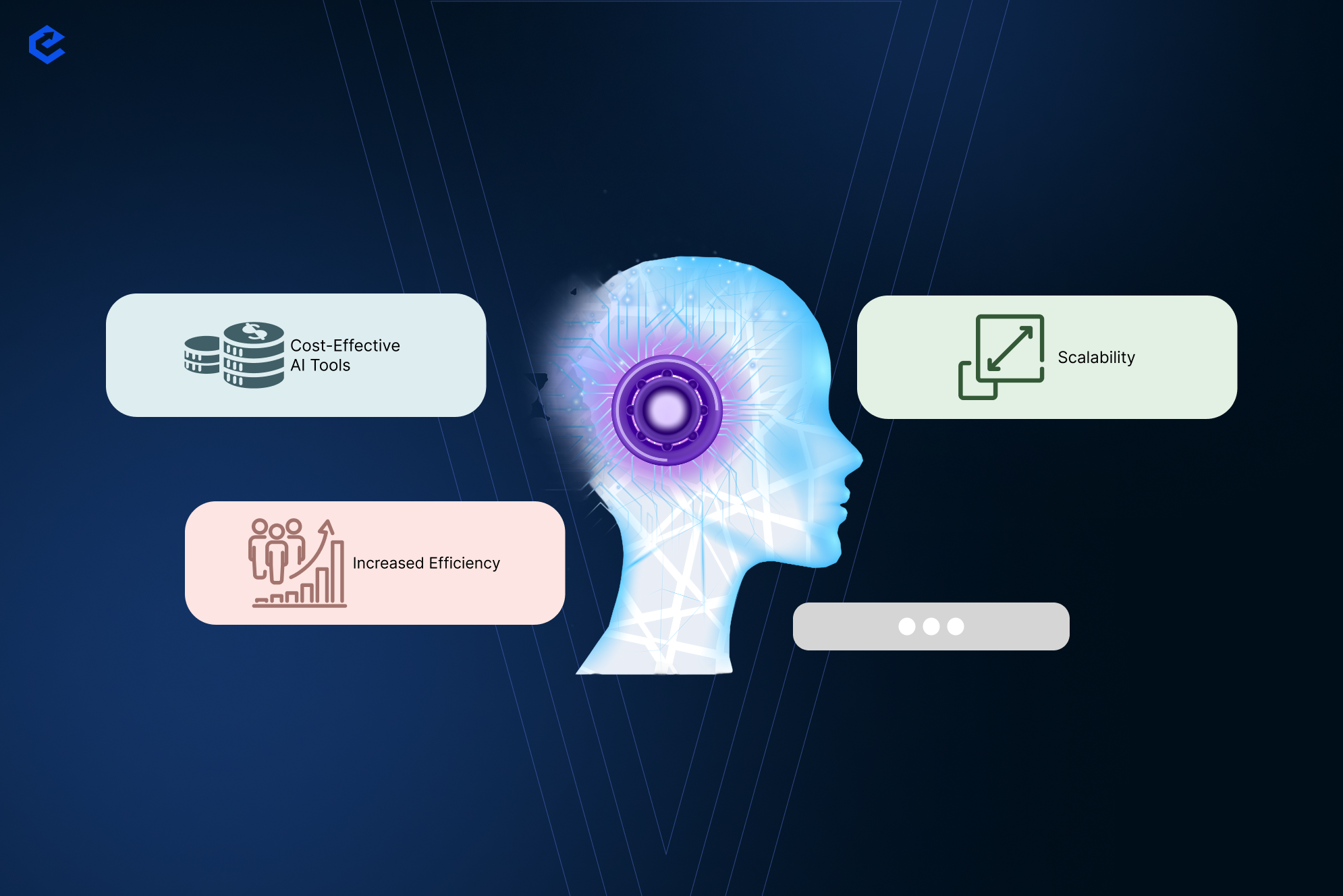
AI for Small Business Owners: Is it Practical?
Implementing AI into everyday activities may seem burdensome to a small business owner, particularly with limited resources. However, with the latest advances in AI technology, it has become more feasible and less costly for SMBs to utilize the power of AI without having to make huge investments.
1. Cost-Effective AI Tools:
AI used to be discussed as a luxury of big companies only. Nowadays, several AI platforms are available that are dedicated to small businesses. They are customer service chatbot marketing provocators based on AI, and automated accounting software. The tools can be scaled, are easily usable on a user-friendly platform, and are affordable so that SMBs do not have to spend as much on these. Providing solutions to address the needs of small businesses, AI is no longer a far-fetched idea to bring operations to a new level.
2. Increased Efficiency:
Artificial intelligence provides automation in small businesses to conduct time-consuming or repetitive functions, including data input, billing, and booking. These processes can be automated, which will significantly eliminate human error, provide more valuable time, and increase the efficiency of businesses. Then, employees can assume their position on more valuable work, such as strategy, creativity, and customer engagement, which eventually results in improved productivity and growth.
3. Scalability:
Scalability is one of the main advantages of AI. A small business is expanding; this means it is increasing its demands. Customer Relationship Management (CRM) systems are AI-driven solutions that can be scaled without problems to reflect growing demand. They can accommodate an increasing number of customers, keep up with more intricate data, and offer a lot of customization, which means that as SMBs scale, they would still be able to deliver the outstanding service they do.
Small businesses can easily integrate AI into their systems through AI consulting services and AI integration services. This can help them increase productivity and efficiency, even without specialized technical knowledge. Artificial intelligence is not just an opportunity for corporations. It can be seen as a valuable and effective tool allowing small business owners to succeed in the digital world.
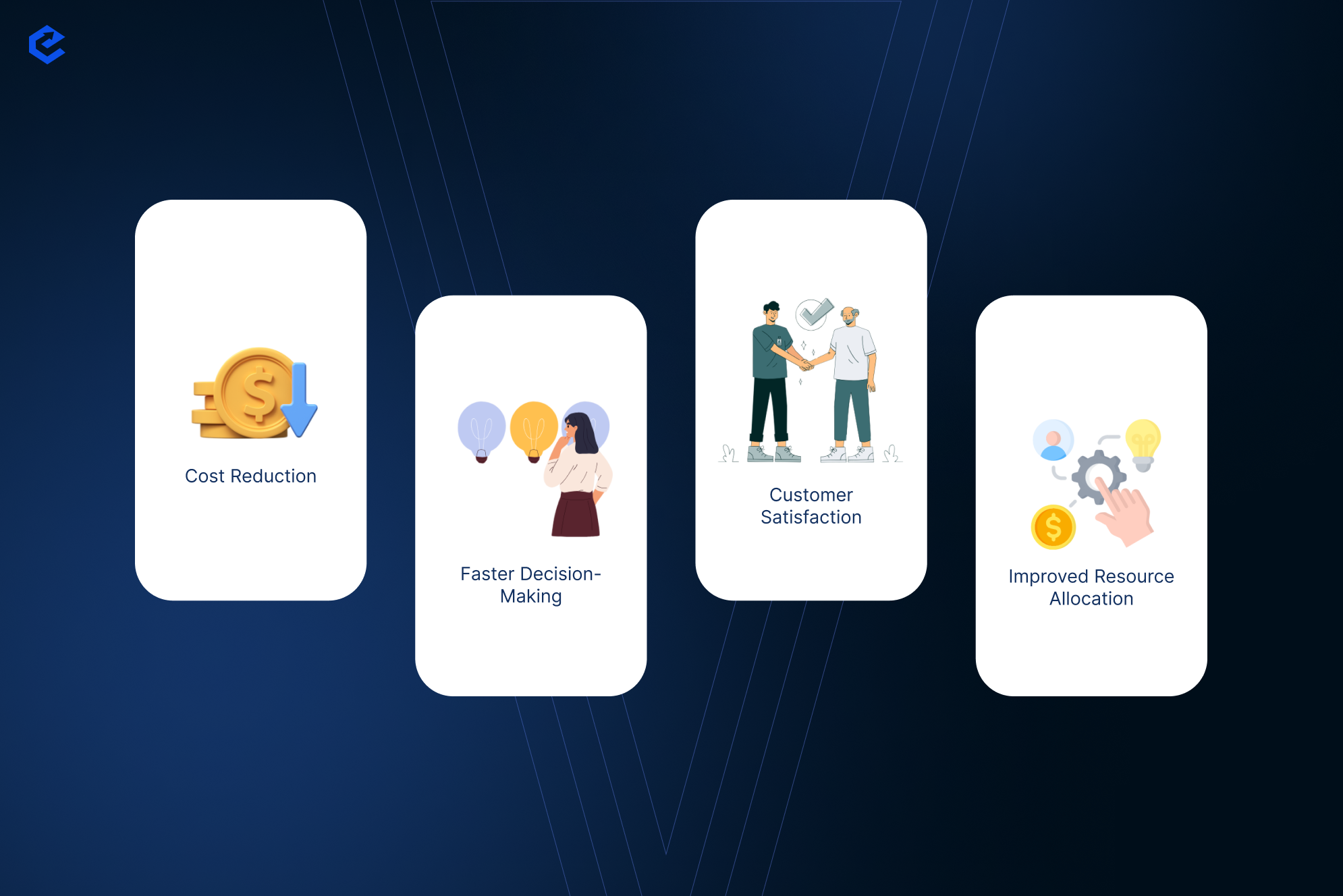
Core Benefits of Using AI for Business Operations
Small and Medium-sized Businesses (SMBs) can use AI in many ways and receive several advantages, such as the optimization of specific processes and a competitive advantage. AI is an excellent contribution to the company’s long-term success as it automates some routine operations and offers valuable insights.
1. Cost Reduction:
Automating repetitive tasks is one of the most direct AI benefits, including data entry, scheduling, and customer inquiries. Businesses can save operational costs by using less human power and dedicating their resources to more strategic processes. Automation due to AI creation of a leaner and more effective operation means that businesses get to cut costs and work at a high standard.
2. Faster Decision-Making:
With the ability to analyze large data in real-time, AI can help businesses utilize their data to make faster and more informed decisions. Generally, the traditional ways of decision-making are cumbersome because data analysis takes a long time, and the processes are time-consuming. Nevertheless, AI will enable companies to have updated information and trends and respond faster to changes within the market. This flexibility allows SMBs to keep up and adjust to the fast-changing market environment.
3. Customer Satisfaction:
AI is essential to increasing customer satisfaction due to the possibility of personalization. Businesses can also use AI tools to categorize their customers depending on their behavior preferences and provide differentiated marketing messages, goods recommendations, and services. This individualistic strategy helps build customer loyalty and increase retention since customers are more inclined to repeat their visit to businesses that satisfy their needs and have become familiar with them.
4. Improved Resource Allocation:
AI is essential in ensuring that businesses optimally allocate their resources by estimating their demand, stock-keeping, and cutting waste. Predictive analytics AI allows forecasting trends and can help SMBs keep the most appropriate number of stocks and avoid overstocking or stockouts. Moreover, AI can augment a supply chain’s manageability by maximizing the cost-effective utilization of resources.
AI Development Solutions play a vital role in helping businesses reap AI’s full potential, with full integration and proper utilization of AI in the current systems.
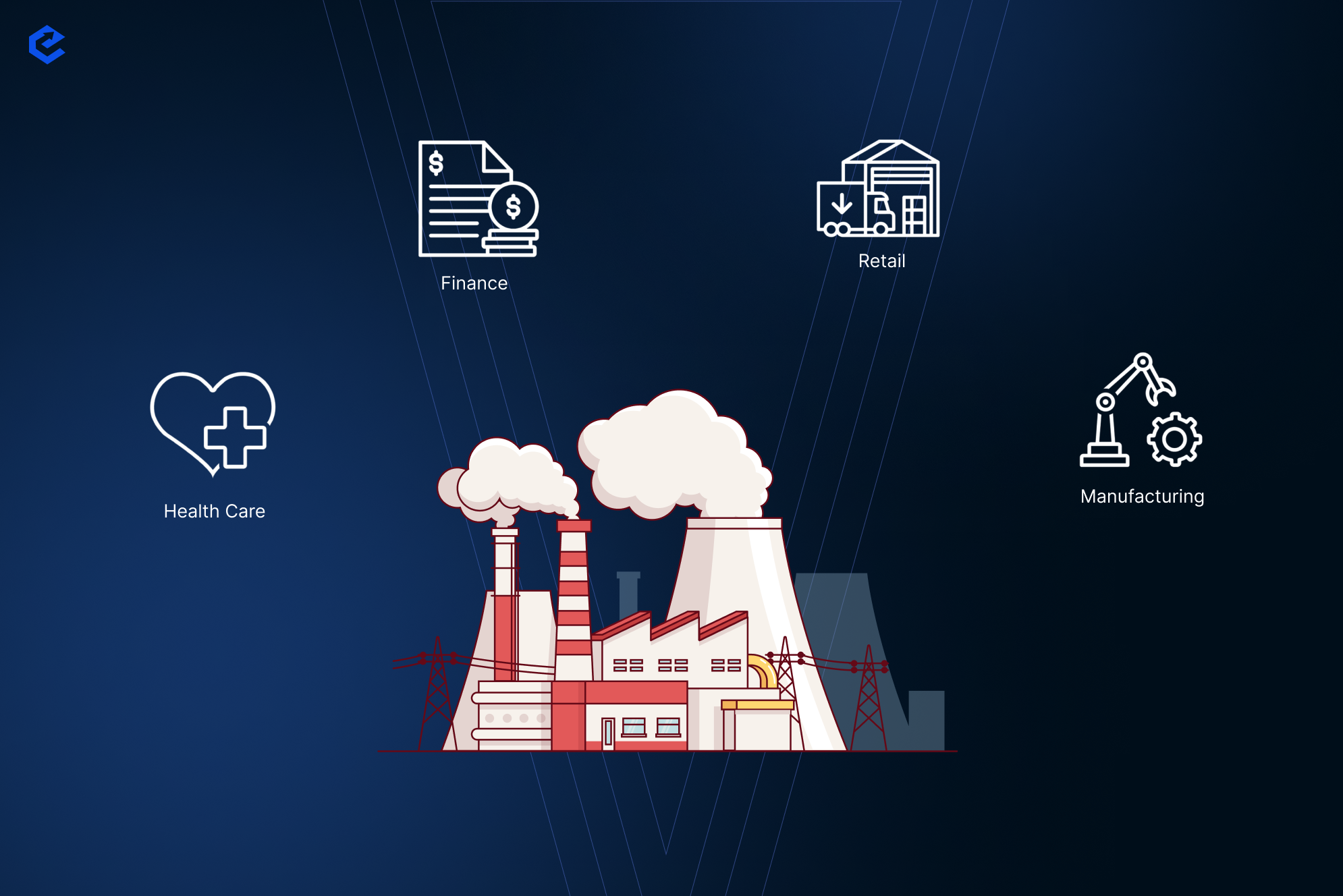
Key Applications of AI Across Industries: Real-World Examples
Artificial intelligence is transforming industries and contributing to better business operations, increasing efficiency, and offering innovative solutions. Some practical examples of AI in other sectors may be considered as follows:
1. Retail:
In the retail sector, AI is changing how companies deal with customers by determining how customers purchase and how to manage inventories. AI-enhanced systems can process consumer data to predict trends in consumer behavior. Hence, the retailers stock the correct inventory at the right time. Moreover, the AI would assist in offering tailor-made product suggestions that rely on past contact with the customers and boost conversion rates and satisfaction levels. Another way retailers employ AI is to automate the supply chain processes, making them cheaper and more efficient.
2. Healthcare:
AI is taking massive steps in the healthcare area, including diagnosing diseases and predicting patient outcomes. Diagnostic. AI-based diagnostic techniques use medical images and patient data to help doctors spot conditions such as cancer, heart disease, and neurological disorders more effectively and quickly. Besides, they are employing AI to predict patient outcomes so that interventions can be made early to offer better treatment plans. Administrative work, like appointment scheduling and billings, is also becoming automated by AI, enabling healthcare providers to pay more attention to patients.
3. Finance:
The finance sector uses AI in fraud prevention, credit rating, and financial process automation. Patterns of transactions can be analyzed on an ongoing basis using AI algorithms, and thus, such activity can be spotted in time to warn institutions of a developing threat. AI can also help with credit scoring, which is simply using large sets of financial data to analyze and determine the creditworthiness of an individual or business entity. In addition, AI automates transactions by minimizing human input, which facilitates the efficiency of financial processes.
4. Manufacturing:
AI reduces wastage in production, ensuring that production is highly optimized by figuring out the maintenance schedule, providing better quality control, and optimizing the supply chain. AI tools allow tracking equipment performance in real-time and anticipating maintenance requirements to reduce expensive downtimes. The systems also use AI to analyze production lines and detect inefficiencies, increasing the output quality and reducing waste.
In such industries, collaboration with an AI software development company can enable businesses to implement tailored AI services to support bespoke needs and address them with the corresponding problems, achieve higher value, and effectively operational escalations.
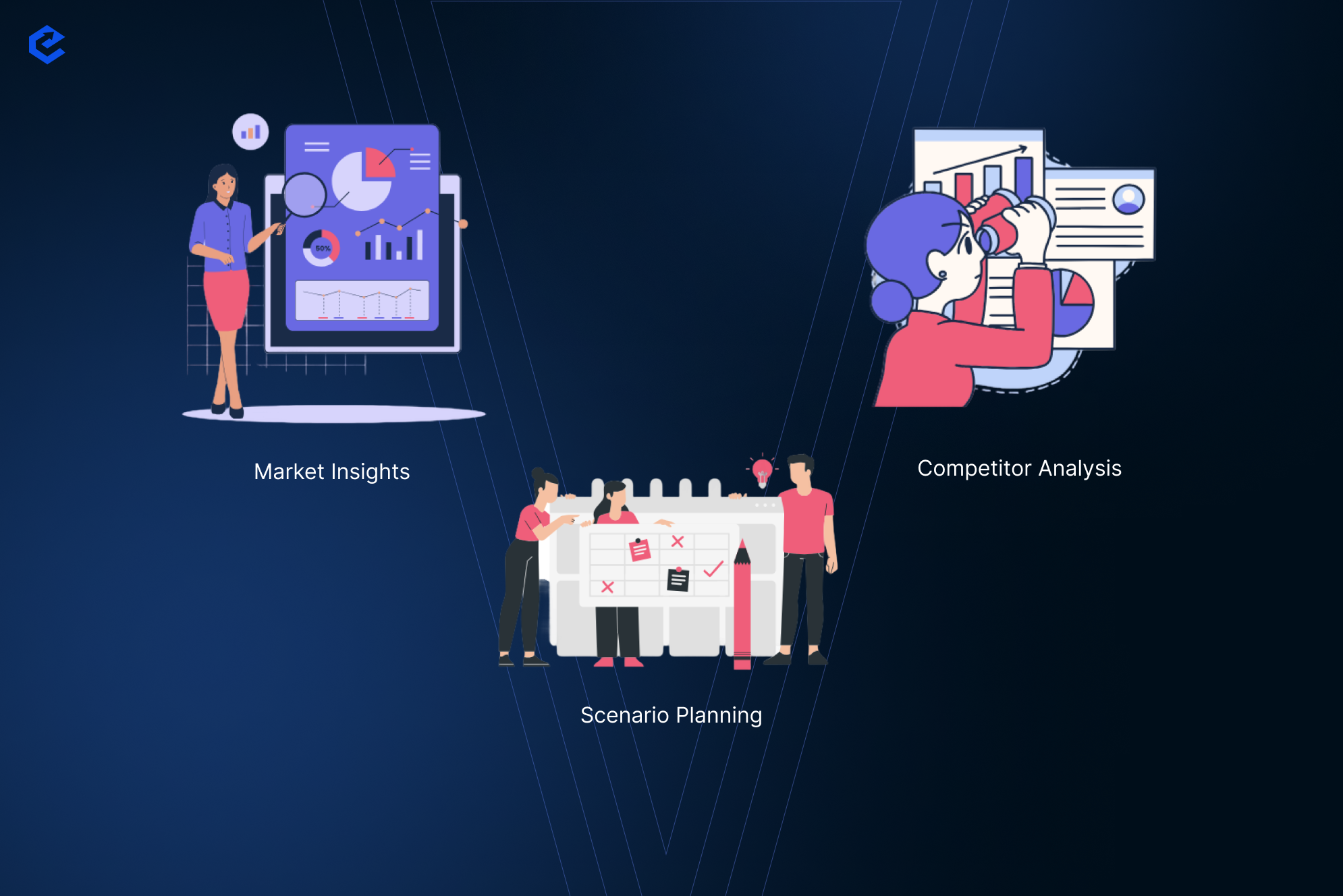
How Does AI Drive Strategic Business Planning?
AI is changing the traditional approach to strategic planning of businesses since it can provide adequate data on judging market trends, consumerism, and business efficiencies. These are how AI boosts strategic business planning:
1. Market Insights:
The AI tools empower the analysis of a vast amount of customer data and market conditions, which allows businesses to understand which trends are new and what the customers want. AI helps businesses answer essential questions about product development, marketing, and customer engagement. They can analyze data about social media, customer feedback, and sales patterns to make decisions.
2. Scenario Planning:
Using simulation models, AI can enable businesses to develop several scenarios, predicting the future of various strategies. This assists the executives in making informed decisions on aspects such as pricing, launching new products, and expanding to new markets through knowledge of the risks and opportunities involved.
3. Competitor Analysis:
AI is also used to monitor the activities of competitors, looking at their market position and strategies. By importing knowledge by analyzing what their competitors are doing in terms of marketing campaigns, product offerings, and financial outcomes, AI aids companies in making real-time adjustments to meet the competitive stream.
AI software development solutions allow the integration of advanced analytics tools into the work of businesses. They must also support long-term strategic goals and ensure data-based decisions for lasting growth and business success.
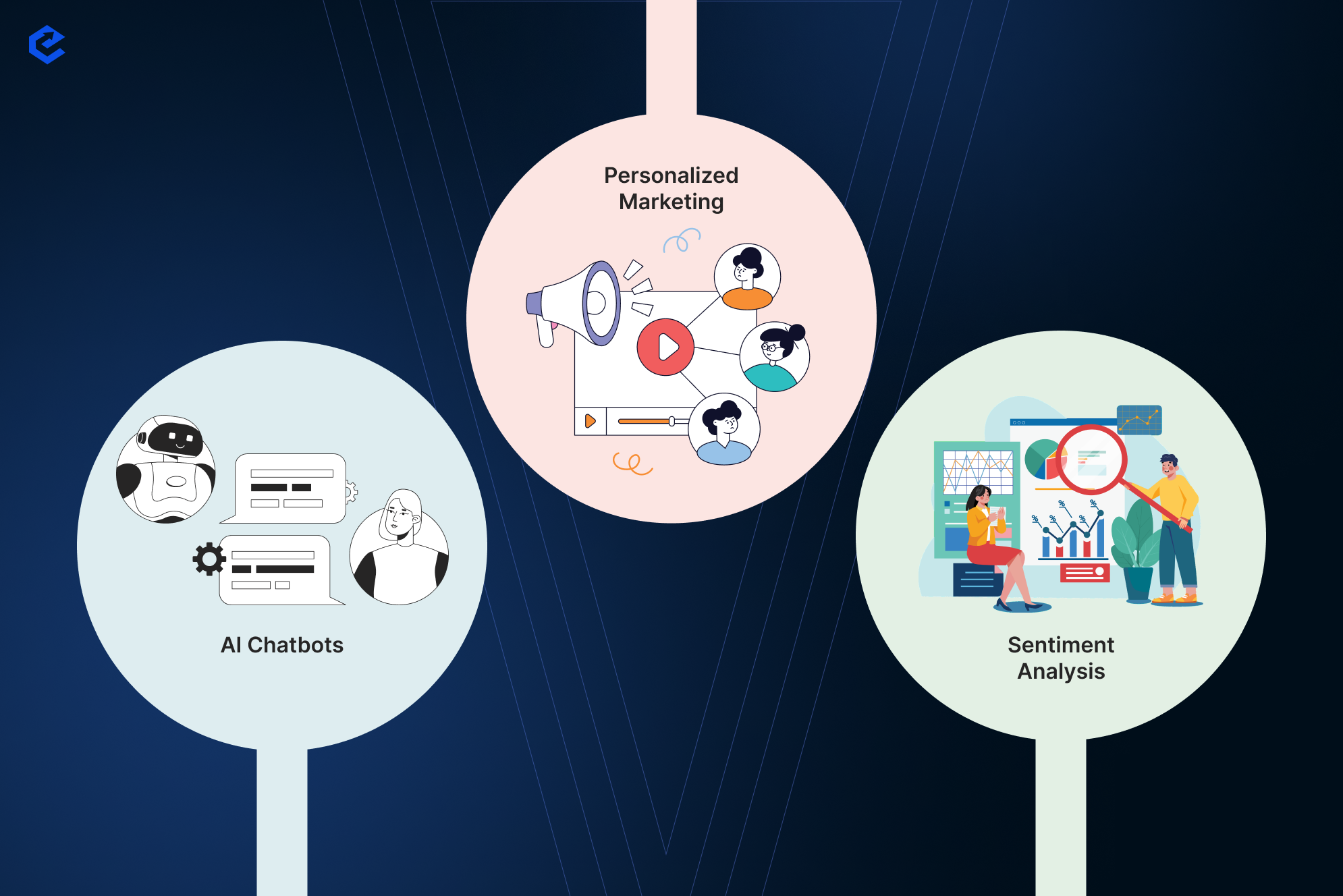
How Does AI Redefine Customer Engagement?
AI has transformed the way of engaging customers and shifted the framework, based on traditional, mass-engaging approaches to more advanced, efficient, and automated experiences:
1. AI Chatbots:
AI Chatbots can work 24/7, providing real-time answers to questions. Such chatbots will give the correct information, help with problems and tracking orders, provide customer support, decrease waiting time, and increase overall customer satisfaction.
2. Personalized Marketing:
AI deconstructs customers’ behavior, preferences, and previous interactions to create highly customized marketing messages. They make up these targeted communications, which, in turn, contribute to greater conversion rates since such messages are based on a particular customer’s needs and provide them with relevant information, suggestions, and offers related to their needs.
3. Sentiment Analysis:
Sentiment analysis tools based on AI analyze the feedback of customers in social media, reviews, and surveys to identify customer sentiment. This will assist businesses in knowing the perception of their products or services and working on the weak areas to make more responsive and customer-oriented decisions.
Using the AI development services of apps, companies can develop their own solutions that attract more customers, build loyalty, and guarantee long-term success. The capacity of AI to individualize contacts, forecast demand, and streamline service delivery is changing how companies relate to their clients.
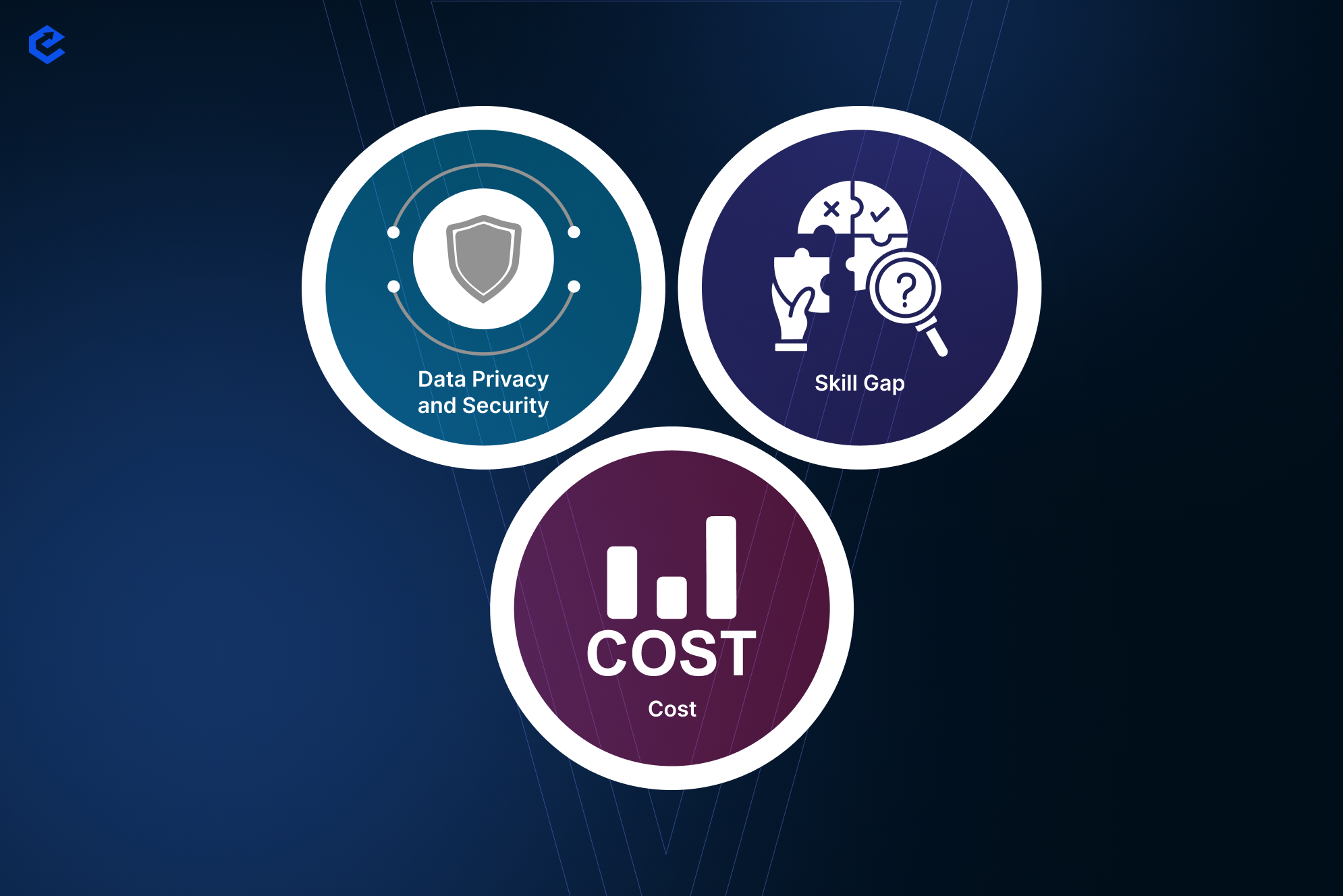
What Are the Major Challenges in AI Implementation, and How to Overcome Them?
Even though AI has a lot of benefits, there are several challenges that SMBs have in implementing AI:
1. Data Privacy and Security: AI needs volumes of data that would violate the privacy and security of data. SMBs need to keep themselves in line with the data protection laws.
2. Skill Gap: A high level of skills is required to implement AI. The SMBs can break this by joining hands with AI Consulting Services, which will help them through the integration process.
3. Cost: AI tools have become cheaper, but the initial investment is relatively high. The initial investment is worth the long-term benefits, including cost savings and more productivity.
How “Eoxys IT Solutions”: AI Development Agency Helps You Integrate AI
Eoxys IT Solutions is a renowned AI development firm that specializes in the facilitation of SMB integration of AI into their business processes. The business also provides custom AI software development and AI integration services to suit the needs of small and medium-sized business clients. At Eoxys IT Solutions, we assist businesses of any size in automating business processes, customer experiences, and operations through our AI app development and AI consulting services.
Eoxys IT Solutions offers:
1. The creation of AI apps enables companies to innovate their interaction with customers and streamline operations.
2. AI consulting firms help companies choose the most appropriate AI tools and integrate them seamlessly into their current systems.
3. AI development services assist businesses in improving competitiveness by harnessing AI-driven growth and innovation.
The Bottom Line
To sum up, AI development solutions are changing how SMBs conduct business, as they help automate their workflow, improve customer support areas, and make data-driven choices. Incorporating AI in commercial enterprises is a concept that can indeed be easily adopted with the support of a skilled AI development firm such as Eoxys IT Solutions, so that businesses can remain relevant in the modern business environment that is highly advancing within the context of 2025.
AI integration services and the creation of AI applications would allow SMBs to maximize their processes, optimize their stock, and increase client interaction, leading to growth and innovation. With the correct tools and experience, SMBs can utilize all the potential of AI to survive in the digital era.
FAQ
How is AI utilized within the business?
AI allows for automating activities, analyzing data, and conducting decision analysis. It streamlines operations and increases customer interaction.
What value can AI bring to small businesses?
AI offers cheap means of automation, customization of customer experience, and forecasts market trends, enhancing efficiency.
Is AI exclusive to large companies?
No, AI is now more accessible even to small businesses because it is available at affordable prices through solutions and tools.
What benefits do AI chatbots bring to the area of customer service?
Chatbot AI immediately answers customer questions when they request it, any time of the day or night, and enhances customer satisfaction rates and response time.
Which industries use AI?
Artificial intelligence is changing the scope of work in retail, healthcare, finance, and manufacturing industries and providing fresh prospects for development and productivity.
What are the problems of AI implementation?
Some challenges are data privacy issues, specialized skills, and the cost of implementation.
What role does Eoxys IT Solutions have in integrating AI into SMBs?
With assistance in growth through AI, Eoxys IT Solutions provides a full range of AI services, such as consultation, development, and integration services to small and medium businesses.
What are the ways that AI can be used to make better business decisions?
AI can examine large volumes of data to deliver actionable insights, adding to faster decisions, and overall, business performance becomes exemplary.



